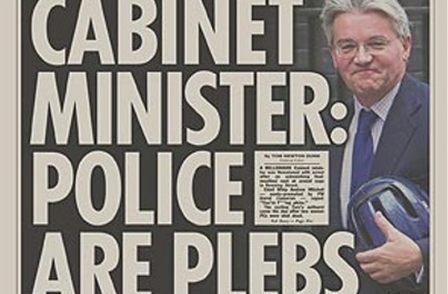
The police officer at the centre of "Plebgate" has denied at the High Court that the words he attributed to former Government chief whip Andrew Mitchell were an "invention".
Mitchell's QC, James Price, challenged Pc Toby Rowland that he gave his version of their September 2012 encounter in Downing Street to justify giving the Cabinet minister a warning under the Public Order Act.
Pc Rowland's account of the altercation over whether Mitchell could cycle through the main vehicle gates was the basis of a story in the Sun, which the MP claims is libellous.
Mitchell claims that the report, which News Group Newspapers (NGN) says is substantially true, meant he was guilty of launching a grossly offensive and arrogant attack at Downing Street police officers, branding them "fucking plebs".
Asked if he had used the words attributed to him by Pc Rowland – "Best you learn your fucking place – you don't run this fucking government – you're fucking plebs" – he told Mr Justice Mitting: "I did not say those words. I would never call a policeman a pleb, let alone a fucking pleb."
The 58-year-old MP for Sutton Coldfield has accepted that he did say, under his breath but audibly "I thought you lot were supposed to fucking help us'", but not at the officer.
Pc Rowland, who is in turn suing Mitchell over statements he made from December 2012 which he says accused him of fabricating his allegations, has said he warned Mitchell because members of the public were visibly shocked by the MP swearing at him.
Price said the shocked members of the public were an invention – as were the words he said Mitchell had used.
"The words you attribute to Mr Mitchell are an invention and they were invented for the same reason – because you could not conceivably have justified giving a Public Order Act warning on what Mr Mitchell actually said."
Pc Rowland said: "No, the evidence I have given is the truth. I recorded exactly what Mr Mitchell said as soon after the event as possible when the facts were fresh in my mind."
The judge said to Pc Rowland that for an offence to be committed under the Public Order Act, it had to be likely that a person who had heard or seen the insulting words, behaviour or disorderly behaviour was likely to be caused harassment, alarm or distress.
He asked the officer: "None of the members of the public could possibly have been caused harassment?"
Pc Rowland said: "I accept that."
Mr Justice Mitting said: "Given that there was a gate between Downing Street (and them) how could they have been caused alarm?"
Pc Rowland said: "Just by the words used in the location where it is."
The judge asked: "How could they have been caused alarm by what was going on in a gated compound?"
Pc Rowland said: "The words used, the manner, the location where it is."
The judge said: "You told me the words were being spoken at you at conversational volume by a man within a gated compound. I don't at the moment understand how anyone outside the gates could be caused alarm by it."
Pc Rowland said: "The best way I can explain is that in Mr Mitchell's evidence under cross-examination he repeated the words, and it was like having a mirror repeat of the incident. It was at conversational volume. I would definitely describe him as agitated. I remember sitting down there (in the well of the court) and thinking 'That is exactly how he did it'."
The judge said: "You mean, when he was repeating the words – vehemently denying them? It was at that volume and pace."
Pc Rowland said: "Yes, I would say he was definitely agitated."
The judge said: "It is plainly possible that somebody could have been caused distress by hearing that language."
Pc Rowland replied: "Yes."
The judge asked: "Are you able to say whether anyone was?"
Pc Rowland replied: "Had I had to arrest Mr Mitchell, I would have got their detail."
Price put it to Pc Rowland that he was not telling the judge, on oath, what he remembered, but was reconstructing events based on documents he had seen in the course of the litigation.
The officer denied this, saying he was giving as accurate an account as he could.
Asked if, after the incident, he asked his fellow officers what a "pleb" was, he said that he did not remember doing so.
Price asked: "Weren't you interested?"
Pc Rowland said: "Not really. While I believe the press have made a big thing of it, to me it's an irrelevance. It was for the swearing that I did it."
He told the judge that he found out the meaning of the word shortly after, from reading the newspapers.
He did not remember a colleague suggesting he write down his account to "cover our arses".
"I haven't written anything to cover my arse. I have written exactly what happened and I have written it accurately."
Price put to Pc Rowland that the account he had given of what happened was "completely false".
Pc Rowland answered: "It is not, my lord."
Price said: "The position is quite clear – that Mr Rowland's account doesn't stand up at all and Mr Mitchell's account is left as one of complete integrity."
Email pged@pressgazette.co.uk to point out mistakes, provide story tips or send in a letter for publication on our "Letters Page" blog
